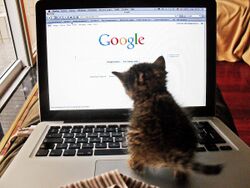Google (verb)
Owing to the dominance of the Google search engine,[1] to google has become a transitive verb.[2] The neologism commonly refers to searching for information on the World Wide Web, typically using the Google search engine.[3] The American Dialect Society chose it as the "most useful word of 2002".[4] It was added to the Oxford English Dictionary on June 15, 2006,[5] and to the eleventh edition of the Merriam-Webster Collegiate Dictionary in July 2006.[6]
Etymology
The first recorded usage of google was as a gerund, on July 8, 1998, by Google co-founder Larry Page himself, who wrote on a mailing list: "Have fun and keep googling!".[7] Its earliest known use as an explicitly transitive verb on American television was in the "Help" episode of Buffy the Vampire Slayer (October 15, 2002), when Willow asked Buffy, "Have you googled her yet?".[8]
To prevent genericizing and potential loss of its trademark, Google has discouraged use of the word as a verb, particularly when used as a synonym for general web searching. On February 23, 2003,[9] Google sent a cease and desist letter to Paul McFedries, creator of Word Spy, a website that tracks neologisms.[10] In an article in The Washington Post , Frank Ahrens discussed the letter he received from a Google lawyer that demonstrated "appropriate" and "inappropriate" ways to use the verb "google".[11]
It was reported that, in response to this concern, lexicographers for the Merriam-Webster Collegiate Dictionary lowercased the actual entry for the word, google, while maintaining the capitalization of the search engine in their definition, "to use the Google search engine to seek online information" (a concern which did not deter the Oxford editors from preserving the history of both "cases").[12] On October 25, 2006, Google sent a request to the public requesting that "You should please only use 'Google' when you're actually referring to Google Inc. and our services."[13]
Ungoogleable is something that cannot be "googled" – i.e. it cannot be easily found using a web search engine, especially Google.[14] If a word or phrase is ungoogleable, it means it cannot be googled. In 2013, the Swedish Language Council attempted to include the Swedish version of the word (Ogooglebar (sv)) in its list of new words, but Google objected to the definition not being specifically related to Google, and the council was forced to briefly remove it to avoid a legal confrontation with Google.[15][16]
See also
- grep
- Photoshop (verb), a similar neologism referring to digital photo editing
References
- ↑ Burns, Enid (June 19, 2007). "Top 10 Search Providers, April 2007". SearchEngineWatch.com. http://searchenginewatch.com/showPage.html?page=3626208.
- ↑ "Google - Definition and More from the Free Merriam-Webster Dictionary". Merriam-webster.com. https://www.merriam-webster.com/dictionary/google.
- ↑ "How Google Became a Verb". The Lingua File - The Language Blog. http://www.thelinguafile.com/2013/02/how-google-became-verb.html.
- ↑ "2002 Words of the Year". American Dialect Society. January 13, 2003. http://www.americandialect.org/index.php/amerdial/2002_words_of_the_y/.
- ↑ Bylund, Anders. "To Google or Not to Google." The Motley Fool. July 5, 2006. Retrieved on March 28, 2007.
- ↑ Harris, Scott D. (July 7, 2006). "Dictionary adds verb: to google". San Jose Mercury News. http://www.mercurynews.com/mld/mercurynews/business/14985574.htm.
- ↑ Page, Larry (July 8, 1998). "Google Search Engine: New Features". Google Friends Mailing List. http://www.egroups.com/group/google-friends/3.html.
- ↑ Arthur, Charles (2012). Digital Wars: Apple, Google, Microsoft and the Battle for the Internet. Kogan Page Publishers. p. 48. https://archive.org/details/digitalwarsapple0000arth. Retrieved January 2, 2013.
- ↑ McFedries, Paul (February 23, 2003). "Google trademark concerns". American Dialect Society Mailing List. http://listserv.linguistlist.org/cgi-bin/wa?A2=ind0302D&L=ads-l&P=R2450.
- ↑ Duffy, Jonathan. "Google calls in the 'language police'." BBC News. June 20, 2003. Retrieved on July 7, 2006.
- ↑ Frank Ahrens (August 5, 2006). "So Google Is No Brand X, but What Is 'Genericide'?". The Washington Post. https://www.washingtonpost.com/wp-dyn/content/article/2006/08/04/AR2006080401536.html.
- ↑ Noon, Chris. "Brin, Page See 'Google' Take Its Place In Dictionary." Forbes . July 6, 2006. Retrieved on July 7, 2006.
- ↑ Krantz, Michael (October 25, 2006). "Do you "Google?"". The Official Google Blog. https://googleblog.blogspot.com/2006/10/do-you-google.html.
- ↑ "Who, What, Why: What is 'ungoogleable'?". BBC News Magazine (BBC). March 27, 2013. https://www.bbc.co.uk/news/magazine-21956743.
- ↑ Fanning, Sean (March 26, 2013). "Google gets ungoogleable off Sweden's new word list". BBC News (BBC). https://www.bbc.co.uk/news/world-europe-21944834.
- ↑ Williams, Rob (March 26, 2013). "'Ungoogleable' removed from list of Swedish words after row over definition with Google: California based search engine giant asked Swedish to amend definition". The Independent. https://www.independent.co.uk/news/world/europe/ungoogleable-removed-from-list-of-swedish-words-after-row-over-definition-with-google-8550096.html.
 |


